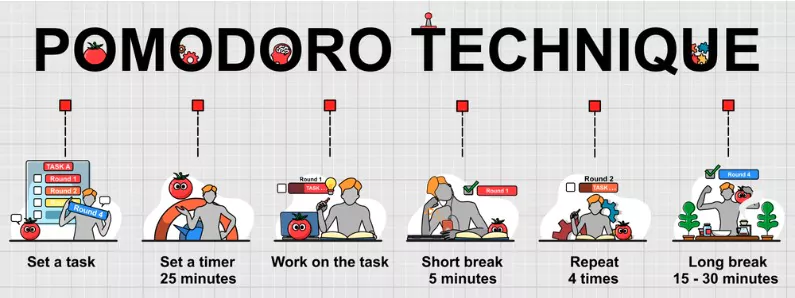How To Study For Long Hours? Practical Tips

How to study for long hours? Embarking on a journey of knowledge and academic excellence often requires more than just dedication and enthusiasm. It demands long hours of focused study, delving into complex subjects, and grasping intricate concepts. Whether you are a student preparing for an important exam, a professional pursuing further education, or an avid learner hungry for intellectual growth, the ability to study effectively for extended periods is crucial.
However, studying for long hours can be challenging. Fatigue, distractions, and a lack of motivation can easily hinder your progress and hinder the absorption of information. To overcome these hurdles and unlock your full learning potential, it is essential to adopt effective study strategies that enhance concentration, retention, and overall productivity.
In this blog post, we will delve into practical tips and proven techniques on how to study for long hours, enabling you to study for long hours with focus and efficiency. From creating a conducive study environment to incorporating effective time management techniques, we will explore a range of strategies tailored to suit your unique learning style.
- Understanding the Need: How to Study for Long Hours
- Building the Foundation
- Building Your Study Plan: Techniques to Study for Long Hours
- Managing Time and Environment: Keys to Study for Long Hours
- Fuelling Motivation: The Driver to Study for Long Hours
- The Role of Breaks: The Unsung Hero in the Process to Study for Long Hours
- Wrapping Up
1 Understanding the Need: How to Study for Long Hours
As our academic or professional commitments intensify, the need to grasp “how to study for long hours” often becomes crucial. This need arises not from the mere desire to spend countless hours in front of books or screens but to utilise those hours in the most effective and efficient way possible. Let’s examine the fundamental pillars of prolonged studying and how you can leverage them to your advantage.
2 Building the Foundation
The first step to understanding how to study for long hours is recognising the role of our physical and mental health.
Physical Well-being

Enduring long hours of study requires a healthy body. Regular exercise, a balanced diet, and adequate sleep are prerequisites to maintaining your physical stamina.
- Regular Exercise: Incorporate at least 30 minutes of moderate-intensity exercise into your daily routine. This could be a brisk walk, yoga, or any other form of physical activity that you enjoy. Exercise boosts your energy levels, improves concentration, and helps reduce stress, thus promoting a positive study environment.
- Balanced Diet: Maintain a diet rich in fruits, vegetables, lean proteins, and whole grains. Avoid excessive caffeine or sugary foods that lead to energy crashes. Regular meals and healthy snacks at intervals keep your energy levels steady.
- Adequate Sleep: The importance of a good night’s sleep in improving memory and cognitive functions is well established. A sleep-deprived brain struggles to focus and retain information, which is counterproductive when studying for long hours.
Mental Well-being

Understanding how to study for long hours is not just about physical stamina; it’s about mental endurance as well.
- Stress Management: Long hours of study can often lead to stress. Incorporate stress management techniques, such as mindfulness, meditation, and deep breathing exercises, into your routine to help maintain a calm and focused mind.
- Positive Mindset: Developing a positive attitude towards your study goals is vital. Break down your goals into manageable chunks and celebrate small victories to keep yourself motivated.
Now that we have laid the foundation, let’s delve deeper into the techniques and strategies to understand how to study for long hours.
3 Building Your Study Plan: Techniques to Study for Long Hours
Understanding how to study for long hours effectively revolves around careful planning and incorporating certain learning techniques.
The Pomodoro Technique

This time-management method breaks your study hours into intervals, typically 25 minutes of focused studying followed by a 5-minute break. After completing four such cycles, take a longer break of 15-30 minutes. This technique can effectively manage mental fatigue and maintain concentration over extended periods.
Spaced Repetition
An effective way to retain information over longer periods, spaced repetition involves reviewing information at increasing intervals over time. This technique is particularly useful for subjects that require memorisation.
Active Recall
The active recall involves actively testing your memory during the learning process. This could be through flashcards, quizzes, or teaching what you’ve learned to someone else. Active recall makes your study sessions more interactive and enhances retention.
4 Managing Time and Environment: Keys to Study for Long Hours
Time Management

Effective time management is crucial when learning how to study for long hours. Prioritise your subjects or topics based on their complexity and the time you need to master them. Use tools like planners, calendars, or apps to keep track of your progress.
- Early Bird or Night Owl?: Identify your peak concentration periods. Some people are more alert in the early morning, while others find their stride at night. Tailor your study schedule to align with your natural rhythms.
- Realistic Scheduling: Allocate enough time for each subject or topic but avoid overly ambitious plans that might lead to burnout. Remember, the aim is sustainable long-term studying, not cramming.
Study Environment
The environment where you study plays a significant role in determining your ability to study for long hours.
- Quiet and Distraction-Free Zone: Choose a quiet, well-lit space with minimal distractions. This not only includes physical distractions but digital ones as well. Consider using website or app blockers if needed.
- Comfortable Setting: Ensure your study space is comfortable. An ergonomically designed chair and desk can help avoid physical discomfort during long hours of study.
- Organised Space: Keep your study materials organised. This saves time looking for resources and maintains the flow of your study session.
5 Fuelling Motivation: The Driver to Study for Long Hours
Understanding how to study for long hours is as much about motivation as it is about techniques and environments.
Set Clear Goals
Having clear, achievable goals gives you a sense of direction and purpose. These goals could be long-term (like acing an exam or mastering a skill) or short-term (like completing a chapter or a project). Use SMART (Specific, Measurable, Achievable, Relevant, Time-bound) goals for better results.
Reward Yourself
Rewards can serve as great motivators. This could be a favourite snack, a walk, a short nap, or even a few minutes on social media. After achieving a study target, allow yourself a reward.
Visualise Success
Visualising yourself achieving your study goals can be a powerful motivator. This positive imagery can boost your confidence and keep you driven during long study sessions.
6 The Role of Breaks: The Unsung Hero in the Process to Study for Long Hours
Ironically, one of the most important aspects of learning how to study for long hours is knowing when to take breaks. Breaks help prevent burnout, improve focus, and enhance information retention.
- Scheduled Breaks: Incorporate short breaks into your study plan. As suggested earlier, the Pomodoro Technique can be very effective.
- Active Breaks: Use your break to stretch, walk around, or engage in any physical activity. This helps to refresh your mind and body.
- Mindful Breaks: Use breaks to practice mindfulness or meditation. This can help clear your mind and improve focus when you resume studying.
7 Wrapping Up
The journey of understanding how to study for long hours can be challenging but rewarding. It demands a well-balanced lifestyle, efficient planning, a conducive environment, motivation, and smart work. By adopting the strategies shared in this blog, you’ll be well on your way to mastering the art of studying for long hours. Always remember that the goal is not just to study for long hours but to make those hours count.
Community Q&A
About This Article
This article has been viewed 448 times.



